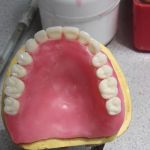What to Do if Your Child Knocks Out a Baby Tooth
- Understanding Baby Teeth
- Steps to Take If Your Child Knocks Out a Baby Tooth
- When to See a Dentist
- Preventing Tooth Injuries in Children
- Real-Life Examples of Knocked-Out Baby Teeth
- Where to Learn More About Child Dental Care
Understanding Baby Teeth
Baby teeth, also known as primary teeth, play an important role in your child's oral health development. These teeth allow your child to chew and speak clearly, and they help maintain space for the permanent teeth that will eventually grow in. Typically, a child’s baby teeth begin to emerge around 6 months of age and are usually lost by the time they are 12 or 13 years old. However, baby teeth are not as strong as adult teeth and are more susceptible to injury, especially during the active years when children are playing and exploring their environment.
It’s important for parents to understand how to care for baby teeth and what to do if an accident occurs, such as when a baby tooth is knocked out. Knowing the correct steps to take can help ensure that your child's dental health remains intact and that any potential damage to the gums or adult teeth is minimized.
Steps to Take If Your Child Knocks Out a Baby Tooth
Accidents happen, and if your child knocks out a baby tooth, it’s essential to stay calm and follow a few important steps:
- Stay Calm: The first thing you should do is stay calm. It’s important to reassure your child and keep them calm as well. Pain or fear from the situation may make things more difficult.
- Clean the Area: Gently rinse your child’s mouth with warm water to clean any debris. Avoid using any harsh antiseptic solutions that might irritate the gums.
- Apply Pressure if Necessary: If the area is bleeding, apply gentle pressure with a clean gauze pad or cloth to stop the bleeding. Most bleeding should stop within a few minutes.
- Save the Tooth: If the tooth has been completely knocked out and it’s still intact, you may want to keep the tooth. While baby teeth can’t typically be re-implanted, saving it allows the dentist to check the condition of the surrounding gums.
- Contact Your Dentist: Call your dentist immediately for advice on next steps. They may recommend an appointment to check for any potential damage to the surrounding teeth or gums.
While baby teeth may not require the same urgent care as adult teeth, following these steps ensures that any potential complications are addressed quickly and efficiently.
When to See a Dentist
If your child knocks out a baby tooth, it’s important to seek dental care as soon as possible. While baby teeth are eventually replaced, the primary concern is the health of the surrounding tissue and ensuring that the adult teeth beneath aren’t damaged. In certain cases, a dentist may need to evaluate your child’s gums to ensure that there is no damage to the developing adult teeth.
You should also visit the dentist if:
- Your child experiences severe pain or discomfort following the injury.
- The gums show signs of infection, such as redness, swelling, or pus.
- There is significant bleeding that doesn't stop after a few minutes.
A dentist will provide a thorough examination and determine if any treatment or follow-up care is necessary.
Preventing Tooth Injuries in Children
To prevent tooth injuries in the future, consider implementing these safety measures:
- Use Mouthguards: If your child is involved in sports, especially contact sports, make sure they wear a mouthguard to protect their teeth.
- Teach Safe Play: Encourage children to play safely and avoid activities that can lead to falls or injuries. Make sure they understand the importance of being cautious when playing outside or with pets.
- Ensure Proper Diet: A balanced diet that promotes strong teeth is essential. Foods rich in calcium and vitamin D can help protect your child’s teeth and gums.
While it’s impossible to prevent every accident, taking these precautions can help minimize the chances of dental injuries and protect your child's teeth as they grow.
Real-Life Examples of Knocked-Out Baby Teeth
Many parents have experienced the worry and confusion that comes with a knocked-out baby tooth. For example, Jennifer, a mother of two, recalls when her daughter, Lily, knocked out her first baby tooth while playing soccer. “At first, I panicked, but then I remembered what I’d read about what to do in this situation. I cleaned the area, applied pressure, and contacted our dentist. The dentist reassured me that it was normal, but it still made me nervous,” she says. “It was such a relief to hear that everything would be fine.”
This story highlights how staying calm and following the right steps can help parents manage these situations effectively. A visit to the dentist allowed Jennifer to confirm that Lily's gums were healing properly and that no further action was necessary.
Where to Learn More About Child Dental Care
If you want to learn more about how to care for your child’s teeth and what to do in case of dental emergencies, visit Dentistry Toothtruth, a trusted resource for pediatric dental care. They offer helpful tips and expert advice on everything from baby teeth to permanent teeth, ensuring your child’s oral health is always on track.
Don't wait for an emergency—learn more today to ensure that your child’s dental health is in the best hands.







 Dorfman Orthodontic Group - Bensalem5.0 (199 review)
Dorfman Orthodontic Group - Bensalem5.0 (199 review) Dental Solutions of Roxborough4.0 (219 review)
Dental Solutions of Roxborough4.0 (219 review) Suburban Dental Medicine4.0 (31 review)
Suburban Dental Medicine4.0 (31 review) Smiles Divine Dental4.0 (25 review)
Smiles Divine Dental4.0 (25 review) Icon Dental4.0 (48 review)
Icon Dental4.0 (48 review) Affordable Dentures & Implants4.0 (443 review)
Affordable Dentures & Implants4.0 (443 review) The Importance of Oral Health Education During Pregnancy for a Healthy Pregnancy
The Importance of Oral Health Education During Pregnancy for a Healthy Pregnancy Best Tips for Brushing Your Teeth Properly for Healthy Gums: Essential Techniques for Oral Health
Best Tips for Brushing Your Teeth Properly for Healthy Gums: Essential Techniques for Oral Health Why Skipping Dental Checkups Can Lead to Bigger Oral Health Problems
Why Skipping Dental Checkups Can Lead to Bigger Oral Health Problems Advantages of Porcelain Dental Restorations
Advantages of Porcelain Dental Restorations How Can Diabetes Cause Tooth and Gum Problems? Preventing and Managing Oral Health Issues
How Can Diabetes Cause Tooth and Gum Problems? Preventing and Managing Oral Health Issues Healthy Habits for Promoting Good Oral Health and Hygiene: Tips for a Healthy Smile
Healthy Habits for Promoting Good Oral Health and Hygiene: Tips for a Healthy Smile